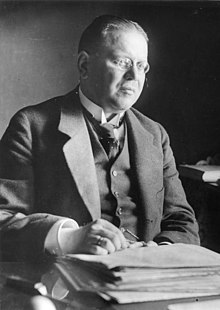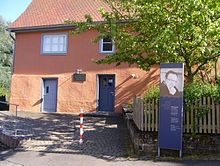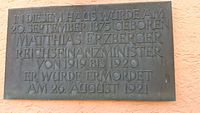Matthias Erzberger
Matthias Erzberger | |
|---|---|
 Erzberger in 1919 | |
| Vice-Chancellor of Germany | |
| In office 21 June 1919 – 3 October 1919 | |
| Chancellor | Gustav Bauer |
| Preceded by | Bernhard Dernburg |
| Succeeded by | Eugen Schiffer |
| Minister of Finance | |
| In office 21 June 1919 – 12 March 1920 | |
| Chancellor | Gustav Bauer |
| Preceded by | Bernhard Dernburg |
| Succeeded by | Joseph Wirth |
| Minister without portfolio | |
| In office 9 November 1918 – 20 June 1919 | |
| Minister-President | Friedrich Ebert (de facto) Philipp Scheidemann |
| Serving with | Eduard David Georg Gothein |
| Member of the Reichstag for Württemberg | |
| In office 24 June 1920 – 26 August 1921 | |
| Preceded by | Constituency established |
| Succeeded by | Hermann Eger |
| Member of the Reichstag for Württemberg 16 | |
| In office 3 December 1903 – 9 November 1918 | |
| Preceded by | Gebhard Braun |
| Succeeded by | Constituency abolished |
| Personal details | |
| Born | 20 September 1875 Buttenhausen, Württemberg, German Empire |
| Died | 26 August 1921 (aged 45) Bad Griesbach, Baden, Germany |
| Political party | Centre Party |
| Occupation | Politician |
Matthias Erzberger (20 September 1875 – 26 August 1921) was a politician of the Catholic
Erzberger was first elected to the
He was elected to the
Both his role in ending the war and his financial policies earned him the enmity of the political right. On 26 August 1921, he was assassinated by two members of the right-wing terrorist group Organisation Consul.
Early career
He was born on 20 September 1875 in Buttenhausen (today part of Münsingen) in the Kingdom of Württemberg, the son of Josef Erzberger (1847–1907), a tailor and postman, and his wife Katherina (née Flad; 1845–1916).[1][2] In his early life he gained massive weight, which he lost in the course of thirty years. He attended the seminaries in Schwäbisch Hall and Bad Saulgau, where he graduated in 1894, and started a career as a primary school (Volksschule) teacher.[1] While teaching, he also studied constitutional law and economics at Fribourg, Switzerland.[1] Two years later, he became a journalist working for the Catholic Centre party's publication Deutsches Volksblatt in Stuttgart, where he also worked as a freelance writer.[1][3] Erzberger joined the Centre Party and was first elected to the German Reichstag in 1903 for Biberach. By virtue of unusually varied political activities, he took a leading position in the parliamentary party. He became a specialist in colonial policy[3] and financial policy, contributing to the financial reforms of 1909.[1] In 1912, Erzberger became a member of the leadership of the parliamentary party.[1] He supported a significant military build-up in Germany in the years 1912–13.[1]
In 1900, he married Paula Eberhard, daughter of a businessman, in Rottenburg am Neckar. They had three children (a son and two daughters).[1][2]
World War I
Like many others in his party, he initially supported Germany's involvement in
On 25, 27, and 28 November, Erzberger spoke on modernizing the administration. He won widespread socialist support for attempting through the Bundesrat to protect the civil rights of citizens. In December 1916 he successfully used the Budget Committee of the Reichstag to navigate the Auxiliary Services Act into law. It required all men not in the military or working in certain areas of the economy to be employed in a job vital to the war effort and, in return, recognized trade unions as equal negotiating partners with employers.[6]
Apart from
By 1917, with the armies stalemated on both fronts, Erzberger changed his political stance, becoming one of the leading opponents of
On 9/10 July Bethmann Hollweg obtained a promise from the Crown Council and Emperor Wilhelm II that equal manhood suffrage would be introduced in Prussia after the war to replace the Prussian three-class franchise which apportioned votes based on taxes paid. The promise became known to the public on 12 July.
Erzberger's actions during the first half of July helped to bring about the fall of Bethmann Hollweg.[3] He hoped to have him replaced by Bernhard von Bülow. Instead, Georg Michaelis, the largely unknown and party-unaffiliated nominee of General Erich Ludendorff, became chancellor.[10]
On 19 July Erzberger called a vote on the Reichstag peace resolution which embodied all the points he had made in his speech,[11] calling for a peace without annexations or indemnities, freedom of the seas and international arbitration. The resolution passed 212 to 126. It received the support of Chancellor Michaelis, but when he spoke of supporting it in his inaugural address, he added the proviso "as I interpret it", which he then used as an excuse to ignore it. Erzberger nevertheless succeeded in his main purpose in proposing the resolution, namely to persuade the Social Democrats to continue voting for war loans while a negotiated peace was sought. At the same time, the annexationists, especially those of the nascent German Fatherland Party, began a "wild agitation" against Erzberger. The fact that he succeeded in creating a majority consisting of the Centre, the Progressive Party, and the Social Democrats is considered one of his greatest achievements, since this represented a fundamental upheaval in German domestic politics. Parliament had become involved in matters of foreign policy and warfare that under the constitution were reserved for the emperor, the military leadership and the government. Erzberger emerged from the proceedings surrounding the peace resolution as Germany's most powerful deputy. His attempt to end the war with an amicable peace contributed to his great popularity, especially among the underprivileged classes. On the other hand, he became the most hated man among large sections of the upper classes and in circles that did not want to renounce annexations and rejected demands for a change in Germany's social and political structure.[13][14][15][16]
That same July, at a closed conference in
In March 1918, Erzberger was the most influential supporter in government of the candidacy of Wilhelm, Duke of Urach for the proposed throne of the stillborn Kingdom of Lithuania. Both were Catholics from Württemberg. He tabled a question in the Reichstag on 3 March to General Wilhelm Groener on whether a memorandum had been prepared for the reform of the War Contracting System.
Erzberger's political attempts at peace failed, but his public attack on the war effort and dissemination of information about the fragility of the German military created a climate in which the government found it increasingly difficult to maintain the belief that the war could be won. When, towards the end of the war, the German Navy mutinied at Kiel, the sailors informed their officers that what they wanted was "Erzberger", by then synonymous with "peace". [citation needed]
Signing the Armistice

On 3 October 1918, Erzberger entered the government of Prince
Against hopes that Erzberger would be able to obtain better conditions from the Allies, Marshal
As the head of the German delegation, he signed the
After the war
Returning to Berlin, Erzberger agreed to serve under Ebert as Chairman of the Armistice Commission, a difficult and humiliating task. He fell out with
After the elections for the Weimar National Assembly in January 1919, Erzberger entered the government of the German Republic led by Philipp Scheidemann, again as minister without a specified portfolio, but responsible for matters relating to the armistice.[1] When Scheidemann resigned over the harsh terms of Treaty of Versailles and a new government led by Gustav Bauer took over on 21 June 1919, Erzberger became finance minister and vice chancellor.[1] After the Weimar Constitution came into force in August 1919, Erzberger remained in that position.[3] He supported the Treaty of Versailles, as he saw no military or political alternatives.[1] He was treated with particular contempt by the nationalist right wing as the man who had signed what was coming to be viewed as a humiliating and unnecessary surrender.

However, he succeeded in pushing new taxation measures through the National Assembly.[3] In July 1919, Erzberger introduced what became known as "Erzberger finance reform". The reform pursued two goals. First, it was to give the German federal government supreme authority to tax and spend and thus end the dependence of the central government on the constituent states, as in the former German Empire.[1][20] Second, Erzberger aimed for a significant redistribution of the tax burden, lightening the burden on low- to moderate income households. In July 1919, war levies on income and wealth were introduced, as well as the first German inheritance tax.[18]: 23 In December 1919, an additional a one-time "emergency" tax on wealth was levied, causing outrage among the better-off. In March 1920, a federal income tax followed. Its high tax rates made Erzberger even more unpopular with many on the right.[21]
The German tax code still bears Erzberger's imprint. He stabilized national finances, although they remained strained by the burden of
In his disputes with the political right, Erzberger set himself in particularly sharp opposition to the German National People's Party (the old conservatives), on whom he laid the responsibility for the war; the result was a personal dispute with the leader of the Nationalists, the war-time state secretary for the treasury, Karl Helfferich, who published a brochure titled "Fort mit Erzberger!" ("Get rid of Erzberger!"), and Erzberger was ultimately compelled to bring an action against Helfferich for slander.[1][2] The case was heard in a Berlin court from 19 January to 12 March 1920.[2] The action resulted in a small fine for Helfferich (German law did not make provision for any damages or penalties for slander). The court, however, in its judgment of 12 March 1920, took the line that Helfferich's allegations regarding Erzberger's corrupt business practices and untruthful statements were partly justified. Erzberger was consequently compelled by his party to resign his ministerial office[3] and to give up his seat in the National Assembly[1] in March 1920.
Erzberger assassination attempt
During the trial, Erzberger was wounded in an assassination attempt by a young army ensign named Oltwig von Hirschfeld as he left the court on 26 January 1920.[3] Hirschfeld, "recently subjected to compulsory demobilisation and determined to 'deal with' the most prominent of the 'Versailles traitors'",[22] fired two shots at Erzberger, the first of which "inflicted a shoulder wound, while the second was deflected by the minister's watch chain."[22] Although he was immediately apprehended, Hirschfeld was convicted "not of attempted murder but of 'dangerous bodily harm' [...] and sentenced to a mere eighteen months in prison, then paroled after four months on 'health grounds'".[22]
Erzberger was once more returned to the Reichstag (which replaced the National Assembly) at the general election of June 1920, but in accordance with the wish of his party, he abstained from immediate participation in politics, as proceedings had been instituted against him on a charge of evading taxation. In 1920, he published a memorandum endeavouring to justify his position during the war, and he followed it up with disclosures regarding the attitude of the Holy See in 1917 and the mission of the papal legate in Munich, Eugenio Pacelli (later Pope Pius XII).[3]
Erzberger's power in German politics was based on his great influence with the Catholic working classes in the Rhineland, Westphalia, central Germany and Silesia. In the industrial regions of these districts, the Catholic workers were organized in their own trade unions on lines of very advanced social policy, and Erzberger became the leading exponent of their views in the Reichstag and on public platforms. On the other hand, he incurred the strong opposition of the conservative and landed section of the Catholics, some of the higher clergy such Cardinal Archbishop Felix von Hartmann of Cologne, and the Bavarian agricultural interests as represented by the Catholic Bavarian People's Party in the State Diet at Munich and in the Reichstag in Berlin.[3] Erzberger also was the leader of the left-wing of the Centre Party with Joseph Wirth. At a Reich party committee meeting, he said that "Left is life, Right is death."[23]
Erzberger continued to be pursued by the relentless animosity of the reactionary parties, the conservatives and the national liberals of the German People's Party. This hostility, which amounted to a vendetta, was based not so much upon Erzberger's foreign policy – his negotiation of the Armistice terms and the decisive influence which he exercised in securing the acceptance of the Treaty of Versailles – as upon his financial policies. He was suspect for his activities as finance minister in 1919, as the supporter of liberal Catholic trade unions and, it was said, as political adviser of the Catholic Chancellor of the Reich, Joseph Wirth, who prepared a fresh scheme of taxation designed to impose new burdens upon capital and upon the prosperous landed interests in the summer of 1921.[3]
Assassination

The denunciations of the conservative and national liberal press went beyond the ordinary limits of party polemics. The Tägliche Rundschau observed, in allusion to Erzberger's appearance, "he may be as round as a bullet, but he is not bullet-proof".
Legacy
Erzberger was instrumental in preparing the German nation for peace and in ensuring that the Catholic Centre Party, the predecessor of today's
In the 2022 film All Quiet on the Western Front, Erzberger is portrayed by Daniel Brühl.
-
Inscription at the memorial
-
Stamp of the German Federal Post 1975
Notes
- ^ DHM. Retrieved 25 October 2015.
- ^ a b c d e f g h i j k "Deutsche Biographie: Matthias Erzberger" (in German). Bayerische Staatsbibliothek (BSB). Retrieved 25 October 2015.
- ^ a b c d e f g h i j k l Chisholm, Hugh, ed. (1922). . Encyclopædia Britannica (12th ed.). London & New York: The Encyclopædia Britannica Company.
- ISBN 9780026203104.
- ^ Tuchman, p. 315.
- ^ "Auxiliary Service Law (December 1916)". GHDI (German History in Documents and Images). Retrieved 30 April 2022.
- ^ Erzberger, Matthias (1920). Erlebnisse im Weltkrieg [Experiences in the World War] (in German). Stuttgart / Berlin: Deutsche Verlags-Anstalt. pp. 78 ff.
- ISBN 3-934920-59-4.
- ^ Erzberger. Erlebnisse. pp. 56ff, 82ff.
- ^ a b c Epstein, Klaus (1959). "Erzberger, Matthias. In: Neue Deutsche Biographie 4. [Online-Version]". Deutsche Biographie (in German). Retrieved 25 October 2015.
- ^ a b "Matthias Erzberger 1875-1921". LeMO (Lebendiges Museum Online) (in German). 2014. Retrieved 25 October 2015.
- ISBN 3-7646-1835-3.)
{{cite book}}: CS1 maint: location missing publisher (link - ^ Epstein, Klaus (1962). Matthias Erzberger und das Dilemma der deutschen Demokratie [Matthias Erzberger and the Dilemma of the German Democracy] (in German). Berlin. pp. 206 f., 232 ff.
{{cite book}}: CS1 maint: location missing publisher (link) - ^ Haus der Geschichte Baden-Württemburg, ed. (2011). Matthias Erzberger, ein Wegbereiter der deutschen Demokratie [Matthias Erzberger, a Pathbreaker of German Democracy] (in German). Stuttgart. pp. 37 ff.
{{cite book}}: CS1 maint: location missing publisher (link) - ISBN 978-3-596-17240-5.
- ISBN 978-3-8252-8551-7.
- ^ ISBN 3-463-40423-0.
- ^ ISSN 0046-9408. Retrieved 17 June 2013.
- ^ Wiegrefe, Klaus (8 January 2014). "World War I Continues to Have Relevance 100 Years Later". Der Spiegel.
- DHM. Retrieved 25 October 2015.
- DHM. Retrieved 25 October 2015.
- ^ ISBN 978-1408839911.
- OCLC 219670104.
- Newcastle Morning Herald and Miners' Advocate. No. 13, 604. New South Wales, Australia. 29 August 1921. p. 5. Retrieved 1 December 2022 – via National Library of Australia.
- ISBN 978-0691647746.
- ^ Szejnmann 1999, p. 38.
- ^ Winkler 1998, p. 178.
References
- Diemer, Kurt (1986). Matthias Erzberger (1875–1921). Staatsmann und Demokrat. Biberach: Biberacher Verlagsdruckerei. ISBN 3-924489-36-X.
- Christopher Dowe (Hrsg.), Matthias Erzberger. Ein Demokrat in Zeiten des Hasses, Stuttgart 2013.
- Dowe, Christopher (2011). Matthias Erzberger. Ein Leben für die Demokratie. Stuttgart: ISBN 978-3-17-021491-0.
- Dowe, Christopher (2011). Die Kamera als politische Waffe? Matthias Erzberger im Fokus der Pressefotografen. Heidelberg: Stiftung Reichspräsident-Friedrich-Ebert-Gedenkstätte. ISBN 978-3-928880-34-3.
- ISBN 3-492-00339-7.
- Epstein, Klaus (1959). Matthias Erzberger and the dilemma of German democracy. Princeton: Princeton University Press.
- Matthias Erzberger, ein Wegbereiter der deutschen Demokratie. Buch zur Dauerausstellung der Erinnerungsstätte Matthias Erzberger in Münsingen-Buttenhausen. Stuttgart: Haus der Geschichte Baden-Württemberg. 2011. ISBN 978-3-933726-38-4.
- Matthias Erzberger. Ein Demokrat in Zeiten des Hasses. Karlsruhe: G. Braun Buchverlag. 2013. ISBN 978-3-765-08436-2.
- Heinzelmann, Josef (1969). "Zur Herkunft Matthias Erzbergers". Genealogie. 18: 593–604.
- Krausnick, Michael; Randecker, Günter (2005). Mord Erzberger! Konkursverwalter des Kaiserreichs und Wegbereiter der Demokratie. Norderstedt: Books on Demand. ISBN 3-8334-3586-0.
- ISBN 978-3-922596-75-2.
- Leitzbach, Christian; Erzberger, Matthias (1998). Ein kritischer Beobachter des Wilhelminischen Reiches 1895–1914. Frankfurt am Main: Europäischer Verlag der Wissenschaften GmbH. ISBN 3-631-33492-3.
- Michalka, Wolfgang, ed. (2002). Matthias Erzberger: Reichsminister in Deutschlands schwerster Zeit. Potsdam: Verlag für Berlin-Brandenburg. ISBN 3-935035-32-2.
- Palmer, Christoph E. (2007). Schnabel, Thomas (ed.). Matthias Erzberger 1875–1921, Patriot und Visionär. Stuttgart: Hohenheim-Verlag. ISBN 978-3-89850-141-5.
- Szejnmann, Claus-Christian W. (1999). Nazism in Central Germany: The Brownshirts in 'Red' Saxony. New York: Berghahn Books. ISBN 1-57181-942-8. Retrieved 25 October 2015.
- ISBN 88-7989-428-5. Retrieved 25 October 2015.
- Klaus Epstein (1959), "Erzberger, Matthias", Neue Deutsche Biographie (in German), vol. 4, Berlin: Duncker & Humblot, pp. 638–640; (full text online)
- Robert Leicht: Patriot in der Gefahr. In: Die Zeit, Nr. 34/2011.
- Epstein, Klaus. “Erzberger and the German Colonial Scandals, 1905-1910.” The English Historical Review 74, no. 293 (1959): 637–63. http://www.jstor.org/stable/558886.



